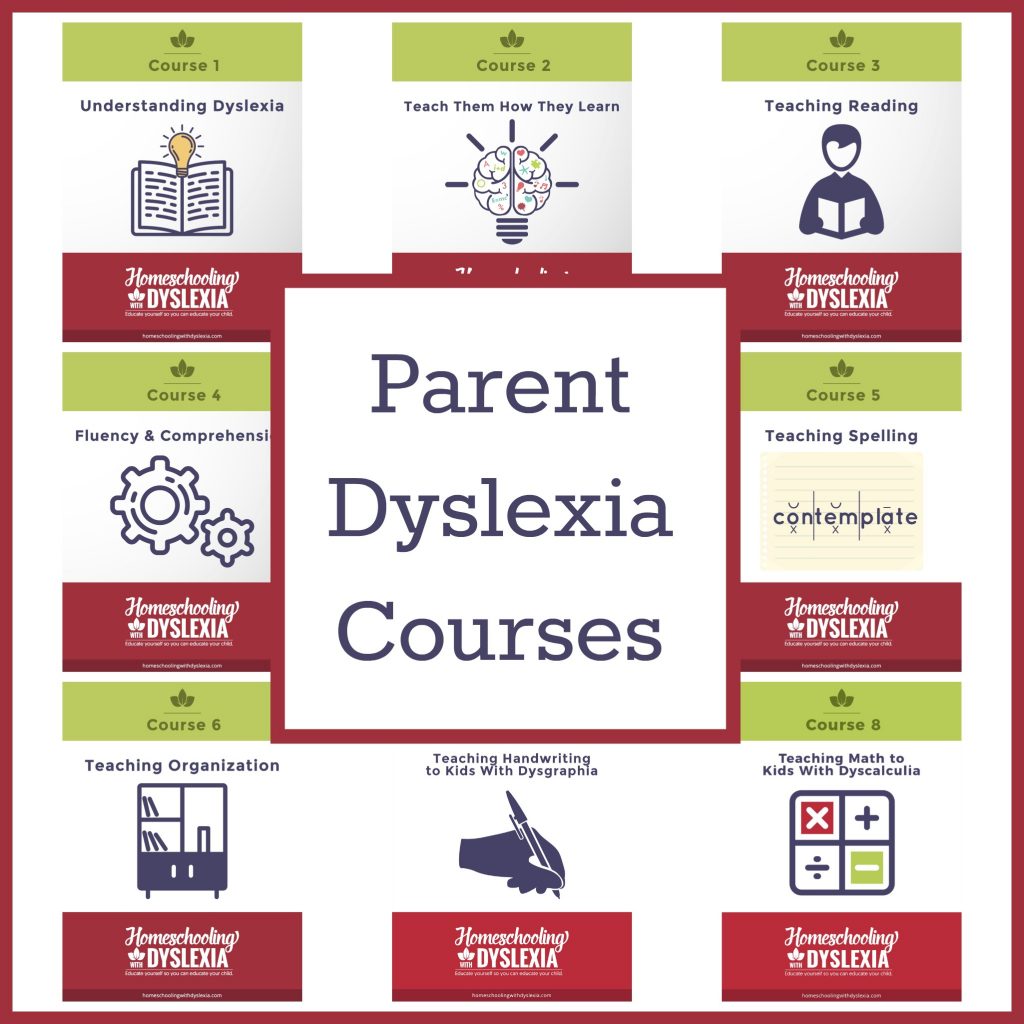Do you feel your kids with dyslexia are misunderstood by friends and family? Here are some simple and easy ways how to explain dyslexia to friends and family so they can offer the support and compassion you need.
If you would prefer to listen to this post, click on the play below:
We’re coming up on the holiday season with all of the family gatherings for Thanksgiving, Christmas, and the New Year. To be totally honest, this isn’t always the time of joy and togetherness that many of us hope for. So if that is you, know that you are not alone. {{hugs}}
Besides the usual differences that can divide family members, many of you who are reading this post today also face misunderstandings from family members or loved ones about your kids’ learning delays or your choice to homeschool.
Lots of you left the traditional school system, or like me avoided it altogether, because of the chronic misunderstandings our kids often face within the walls of the traditional school room.
So when our own family members do or say things because of their misunderstandings of learning differences, not only can it can really hurt, it can be super discouraging!
We want to protect our kids so badly but the truth is that misunderstandings about dyslexia are still way too common. When you became a parent (or relative) of a person with dyslexia, you also became (whether you like it or not) an advocate for dyslexia awareness.
Explaining Dyslexia to Friends and Family
When we first started our dyslexia journey over 25 years ago, my family members misunderstood our kids. Over time they were able to see that our kids were indeed smart and capable. Their understanding didn’t come overnight, but it came! Here are some things that I recommend as you help your family members understand dyslexia.
First of all, accept that misunderstandings are going to happen. No matter how much you do to protect your kids, their learning differences will eventually be misunderstood. In a way, this is a positive thing. People can see that our kids are smart so their struggles with reading, writing, memory, or focus don’t match their perceptions of smart kids. The truth is that kids with dyslexia and ADHD are smart but struggle in ways that are unexpected. It can also be helpful to remember how little you knew about dyslexia before you got educated. Having the right expectations in this area makes a huge difference!
Know that your support of your kids far outweighs any hurt caused by misunderstandings. Even though someone may hurt your child’s feelings (or yours) the understanding and support you provide for your kids is the most important thing. Successful dyslexics repeatedly state that the most impacting factor in their success was the presence of at least one caring adult. Whether a teacher or family member, this person believed in them and advocated for their needs. If you’re reading or listening to this post right now, that person is probably you! Even though it’s hard and upsetting to be judged unfairly, your kids will get through it with your help.
Teach your child about dyslexia so they can advocate for themselves. Unless you plan to hide your kids in their rooms for the rest of their lives (not recommended!), eventually they’re going to have to be able to explain dyslexia to others. Teaching your kids to explain dyslexia will immunize them from misunderstandings. When teaching younger kids about dyslexia, it’s important not to overwhelm them. Try using my children’s book, What is Dyslexia? to help them gain an understanding of what dyslexia is and how it may be affecting them. My 11-year-old read this last year and had many ah-ha moments!
Consider your child’s needs first. If your child really struggles with new or unusual settings or crowds, sounds, or foods – maybe a family gathering isn’t the best thing for them at this time. If you decide to go anyway, see my next tip for how to handle this.
Anticipate your child’s needs. You may need to take breaks from group activities and head outside for a walk or avoid food issues by bringing your own food etc. This doesn’t need to be a negative experience. If your child is getting overwhelmed, suggest something fun like a walk (even in the rain or snow) or going outside to splash in the rain, or building a snowman – whatever will help your child reregulate. For us, going outside was often enough to help my kids relax and be better able to enjoy their visit.

Teach Your Kids How to Talk About Dyslexia
Teach your kids how to explain their dyslexia. This is a big one! Practice a few brief explanations that your child can use to explain why they may not be able to read the instructions on a game or recipe or whatever.
Example for elementary-aged kids: “I have dyslexia. That means my brain is wired a bit differently than yours, but different is okay. It just takes me longer to read, write, and understand information. Please be patient with me. Because of my dyslexia, I have used my creativity to find other ways of doing things.
Example for middle school and high school kids: “Dyslexia makes things like reading and writing a struggle sometimes, but I have used my creativity to find different ways to get things done. I’m good at [fill in the blank here] but my brain’s wiring makes [fill in the blank here] a challenge sometimes.
Example for adults or college-aged kids: “Dyslexia means my brain processes information differently. Everyone has challenges. Once I figured out that I can use tools like audiobooks and computers, I’ve been able to work around my weaknesses. Dyslexia isn’t something I can fix, but I’ve figured out how to work around it where I struggle and embrace it where it helps me.”
Read this post for more information on teaching kids to self-advocate.
Dyslexia Basics to Share
Being able to offer quick bites of information to family members can be helpful. Here are some basic facts about dyslexia that address many of the most common dyslexia myths and misunderstandings.
What dyslexia is: Dyslexia is a neurological learning difference. In other words, if someone has dyslexia, his or her brain is wired to handle information differently. It is also genetic and inherited from family members. This fact can actually make for some interesting conversations!
How dyslexia affects an individual: It can take longer to process information and figure out how to use new data. It can make reading and writing more difficult.
Advantages of dyslexia: Sometimes spatial reasoning and creative thought are easier for people who have dyslexia. People with dyslexia have succeeded in all fields, including business, architecture, and creative arts.
What dyslexia DOESN’T mean: Having dyslexia doesn’t make a person dumb or lazy.
If you’re new to the world of dyslexia, visit the START HERE page on this site for links to more basic information.
Advocacy Helps Friends and Family Understand Dyslexia
Educate Yourself About Dyslexia
Learning to advocate for our dyslexic kids is part of the job description as a parent of a child with dyslexia. Being an advocate starts with you getting educated about dyslexia and other learning differences. This by far has made the biggest impact on my ability to communicate with concerned friends and family about my kids’ struggles.
Get educated by taking one of my parent education courses. Save 30% on any online parent course this week with discount code BF30.

Educate Your Kids Too!
Next, it is important to begin to educate your kids about their learning struggles. I often hear parents say they don’t want to address the subject with their kids because they don’t want to label them. I strongly discourage this mindset for the most part. While there is a time and a place to begin this discussion, I believe it must take place otherwise our kids will come to their own conclusion of why they struggle – usually that they lack intelligence which is not the case.
Read more about labeling kids with dyslexia here.
Read more about talking to your kids about dyslexia here.
Read more about how to teach kids to self-advocate here.
Use my children’s book, What is Dyslexia? A Prent’s Guide to Teaching Kids About Dyslexia to give your kids a simple yet powerful understanding of dyslexia.
Here are some dyslexia resources you can offer family members:
International Dyslexia Association (IDA) Fact Sheets
The IDA has a variety of Fact Sheets that are great for printing up to share with others. You can access the IDA Fact Sheets here.
I Like this Fact Sheet called Dyslexia Basics.
Download this printable list of signs of dyslexia.
How have you talked to friends and family about dyslexia?
PS. Get equipped to defend your decision to homeschool by reading my book No More School: Meeting the Educational Needs of Kids With Dyslexia and Other Learning Differences. It’s a short but powerful read that will help you defend your decision to give your kids a non-traditional education. Spoiler alert, it will also help you on days when even you doubt your decision!






I need to find a Eighth grade curriculum
I have found it more positive to refer to the affected person as “being dyslexic” rather than “having dyslexia”. The former describes an attribute, the latter makes it sound like a disease (and all the accompanying stigmas). BTW, not all dyslexics process information slower than non-dyslexics. Some, like my daughter, have diagnostically very past processing speed. Word retrieval can be difficult, however, with lots of unusual statements combining common phrases, such as “hitting the nail on the jackpot.” Many dyslexics also excel at making unusual connections between ideas (enhancing their creativity) and being able to see the bigger picture in concepts.
We don’t have a diagnosis for our 10 yr old granddaughter. But, her Mom/my daughter know she needs help with reading, comprehension and sounding new words phonetically. Her grades in 4th grade are good, A,B and 1 C. She has a diagnosis of ADHD & an anxiety for which she is medicated. She has many of the symptoms of dyslexia as listed above. Is also a chronic liar about even small things that don’t even matter. Memory on spelling tests is great, but probably won’t recognize same word in future readings. Has NO concept of date or time. We r just beginning to start exploring dyslexia and your blog has been helpful.
God bless,
Ronnell Stirsman
Hi Ronnell. Welcome! I’m glad you found us!
It is a journey. I’ll tell you, homeschooling can help a LOT with anxiety and ADHD.